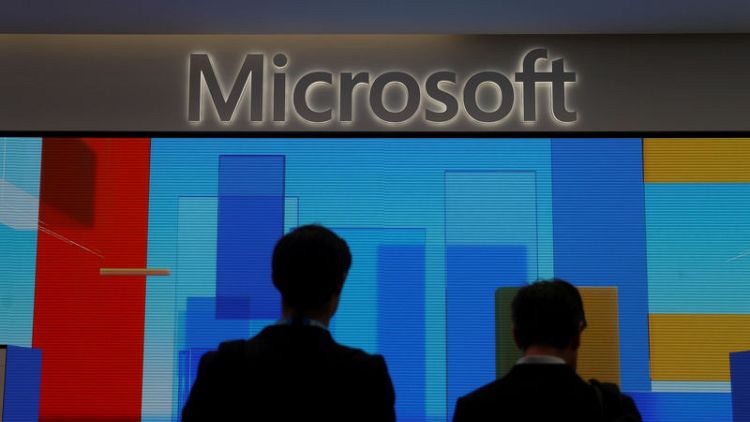(Reuters) - Amazon.com Inc's <AMZN.O> firm grip on the cloud computing market could be threatened by Microsoft Corp's <MSFT.O> multi-billion dollar contract with the Pentagon, Wall Street analysts said on Monday.
Last week, Microsoft won the Pentagon contract termed Joint Enterprise Defense Infrastructure Cloud, or JEDI, that will be worth up to $10 billion (£7.78 billion) over a period of 10 years, beating out favorite Amazon's AWS.
Shares of Microsoft rose as much as 3.4% to a record high of $145.67 on Monday.
"Bottom line, the contract is a significant win for Microsoft and vaults Azure forward in the cloud platform wars," J.P. Morgan analyst Mark Murphy said.
Amazon's Amazon Web Services currently holds about 32% of the cloud computing market, while Microsoft's Azure has about 18%, according to research firm Canalys.
While AWS contributes nearly 13% to Amazon's total net sales, Azure accounts for about 33% of Microsoft's revenue and are both a major cash cow for the companies.
Friday's decision came after months of controversy and protest over the process for awarding the deal and even drawing the attention of President Donald Trump, who has publicly taken swipes at Amazon, long considered the frontrunner.
Analysts at brokerage firm Compass Point said the deal was a "significant victory" for Microsoft over AWS and added that Amazon could challenge the decision.
"We expect a degree of handwringing among Congressional Democrats given the political and practical dimensions of this issue, but our sense is that lawmakers are unlikely to wade too deeply into these waters," Compass Point's Marshall Senk said.
Brokerages Mizuho and Independent Research raised their price target on the Microsoft stock at the prospect of the company getting a boost from the contract.
"In the end, the fact that Azure was chosen as the sole provider for this important project is a testament to just how far it has come over the past couple of years," said Mizuho analyst Gregg Moskowitz, who raised his price target by $8 to $160.
Wedbush analyst Daniel Ives noted that the deal helps Microsoft gain a bigger chunk of an estimated $1 trillion of next decade cloud business and $100 billion of U.S. government business.
(This story corrects paragraph five to say "cloud", not "could")
(Reporting by Ayanti Bera, Tanvi Mehta and Ambhini Aishwarya in Bengaluru; Editing by Maju Samuel)



